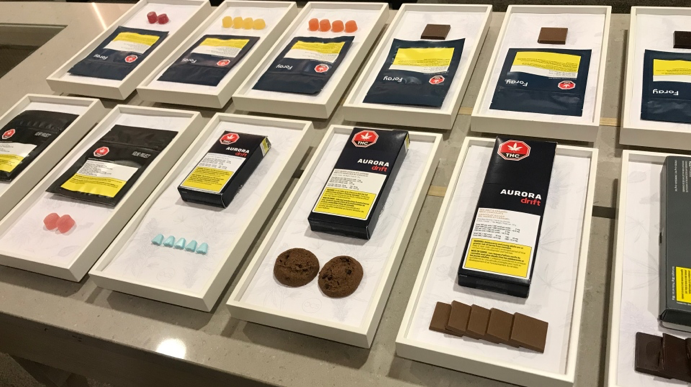
What’s Up in Weed
January 14, 2020
The second wave of recreational cannabis is here. Here’s what you need to know!

What is Cannabis 2.0?
- This is the phrase used to refer to edibles (foods and beverages infused with cannabis), extracts (solid or liquid products that are produced by processing cannabis flower into a concentrated form, to be either ingested or inhaled), and topicals (products such as lotions and oils that have been infused with cannabis extracts and are meant to be applied to the external body surface which includes hair, skin and nails) that were legalized by new regulations to the Cannabis Act that came into force on October 17, 2019.
- Previously, the only types of cannabis products contemplated by the Cannabis Act were dried cannabis flower, cannabis oil, live cannabis plants, cannabis plant seeds, and fresh cannabis (freshly harvested cannabis buds and leaves).
- This new round of products allows for a wide array of new ways of consuming and experiencing cannabis, many of which do not require smoking or combustion.
Which kinds of new products are coming?
- Over 100 different cannabis products are expected to be rolled out in Ontario in early 2020. Here’s a roundup of what you can expect to see from the OCS:
| Category
|
Product
|
Expected Pricing
|
Brands With Products Submitted to OCS
|
| Edibles | Chocolate, cookies, mints, and soft chews | $7 to $14 per package | Tokyo Smoke, Dixie, Aurora Drift, Foray, San Rafael 71 and KOLAB
|
| Beverages | Tea, flavoured soda, and sparkling water | $4 to $10 per 355mL can | Tweed, Haven St and Houseplant
|
| Vapes | Vape pens, 510 thread cartridges, and vape kits | $25 to $125 | Aurora, San Rafael ‘71, RIFF, Solei, Good Supply, dosist, Foray, Kolab, Tweed, LBS, Van der pop, TWD, Tokyo Smoke, FIGR, Edison, Trailblazer, Redecan, Sundial and Top Leaf
|
| Topicals | Creams, bath salts, and body butter | $15 to $55 |
48 North, Earth Dragon, United Greeneries and CBD Acres
|
| Extracts | Shatter, wax, rosin, kief, and hash | $30 to $70 |
Fireside and Canna Farms
|
| Accessories | Dab rigs, storage containers, rehydrating stones, and batteries | $2 to $170 | JUJU Power, Tokyo Smoke LUMA, FIGR, Pulsar, Dewbie and PAX Labs |
When are products going to be available?
- Theoretically, the earliest these products could be available for sale was the week of January 6th, 2020, but no GTA stores had received products by that day.
- According to the OCS, products will actually appear in retail stores and then on OCS.ca as early as January 16th. The initial run of products is likely to include a large number of vapes, some edibles and a brand of tea.
- Actually getting your hands on some might take more time, though: the OCS expects stores to sell out of 2.0 products within the first week of availability, and no extracts (such as hash, shatter, and kief) will be legally available for sale in Ontario until late February or early March.
- Where products do arrive, they’re selling out quickly.
Why weren’t products available as of October 17, 2019 when the new regulations came into force?
- In order to legally ship and sell 2.0 products, licensed producers must first apply for an amended license, submit products for a 60-day review period, and finally pass quality assurance standards. When products meet these criteria, they may be introduced to the market.
- Licensed producers could not apply for the new license until October 17, 2019 when the law first recognized these new product classes. New product rollouts are therefore expected to be staggered as LPs make their way through the regulatory approval process.
What are the rules and requirements for 2.0 products?
- Here’s an infographic from Health Canada setting out details. A summary:
Edibles:
-
-
- 10 mg of THC per package
- No added nicotine, vitamins, or minerals
- Limit to caffeine added
- Cannot require refrigeration
-
Topicals:
-
-
- 1,000 mg of THC per package
- No added nicotine or alcohol
- For use only on skin, hair and nails
- Not for use on eyes or damaged skin
-
Extracts (for vaping):
-
-
- 1,000 mg of THC per package
- No added nicotine, vitamins, minerals, sugars, sweeteners or colours
-
Extracts (for ingesting):
-
-
- 10 mg of THC per unit (for example, a capsule)
- 1,000 mg of THC per package
- No added nicotine, vitamins, minerals, sugars, sweeteners, or colours
- Must include a dispensing device if not in unit form
-
What is the likely impact of Cannabis 2.0?
- A 2019 Deloitte report pegs the potential market for Cannabis 2.0 products at $2.7 billion, but predicts a “slow burn” to start.
- According to ex-Canopy CEO Bruce Linton: “2.0 is the point in which the cannabis industry stratifies. Do you grow biomass, extract oils or create goods that people will line up for? There aren’t going to be that many companies that have the full triangle.
…When you start selling things in milligrams, it’s a different story. Grams aren’t a brandable thing. It’s not a unique formulation. 2.0 is about milligrams. Milligrams are an extracted formulation. The options around a milligram is limitless.
…Margin opportunities are higher in creating branded milligram products. If you can’t sleep and you get a formulation with cannabinoids that helps you, what would you pay for that? Whatever the price is. And if the active ingredients costs 20-cents, whoever makes that… that’s who wins.”
Where can I find more information?
- The OCS has produced some helpful “101” guides about edibles, extracts, and topicals.
- The Council of Chief Medical Officers of Health put out a solid press release.
Cool Links
- SkyLaw client New Maple Holdings Ltd. had a magical holiday season: its wholly-owned subsidiary CanWe Growers Inc. became a licensed producer on December 20, 2019. SkyLaw incorporated New Maple Holdings exactly three years to the day before that, on December 20, 2016. We couldn’t be more proud of the indefatigable team that New Maple represents. CanWe? Yeah, you sure can!
- Natalie Renner, a partner at Davies, Ward, Phillips and Vineberg LLP, was quoted by the Globe discussing the intersection of the cannabis industry and rules of bankruptcy and insolvency. The biggest issue: cannabis licences can’t be transferred (except through a sale of the LP itself). This significantly reduces the pool of possible buyers for distressed assets, Natalie explained. “In liquor, which is a great example, they have the ability to transfer a licence to the insolvency professional, a receiver, and they have the ability to hold the licence for the purposes of operating the business in lieu of the company’s management.” Natalie noted the need for a cannabis as a regulated industry to have carve-outs to deal with insolvencies and transfers of licences.
- New York will legalize recreational cannabis this year: Gov. Andrew Cuomo.
- After a petition, the Ohio medical board will consider whether being a fan of the Cleveland Browns or Cincinnati Bengals NFL teams, which have not had a playoff win since 1995, is a condition that officially qualifies for medical marijuana use.
What’s Up in Weed is not legal or financial advice. It is a blog by SkyLaw which is made available for informational purposes only and should not be used as a substitute for professional advice from a lawyer. This blog is subject to copyright and may not be reproduced without our permission. If you have any questions or would like further information, please contact us. The SkyLaw team would be delighted to speak with you.
© Copyright SkyLaw 2020. All rights reserved. SkyLaw is a registered trademark of SkyLaw Professional Corporation.
This blog post is not legal or financial advice. It is a blog which is made available by SkyLaw for informational purposes and should not be used as a substitute for professional advice from a lawyer.
This blog is subject to copyright and may not be reproduced without our permission. If you have any questions or would like further information, please contact us. We would be delighted to speak with you.
© SkyLaw . All rights reserved. SkyLaw is a registered trademark of SkyLaw Professional Corporation.